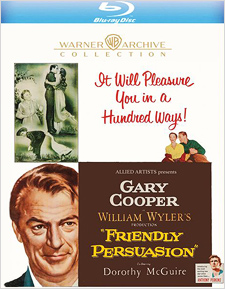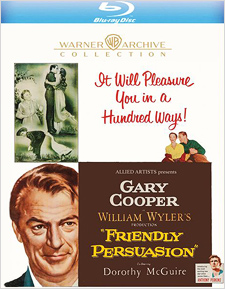Friendly Persuasion (Blu-ray Review)

Director
William WylerRelease Date(s)
1956 (May 14, 2024)Studio(s)
Allied Artists (Warner Archive Collection)- Film/Program Grade: A-
- Video Grade: A-
- Audio Grade: A
- Extras Grade: C+
Review
Masterfully directed by William Wyler, Friendly Persuasion (1956) is a real anomaly of 1950s Hollywood filmmaking, a Disneyesque family-friendly drama about Quakers in 1862 Indiana, with a title tune sung by Pat Boone, no less, a picture in which a goose gets screen credit but its blacklisted screenwriter does not.
Entertaining and powerful but also compromised it explores the boundaries of religious orthodoxy disguised as mainstream entertainment, religious pacifism but through a ‘50s Cold War prism. Adding to its contrariness it was lavishly produced (for $3 million) by a Poverty Row studio heretofore known for super-cheap Westerns and lowbrow Bowery Boys comedies.
Based on Jessamyn West’s 1945 novel, in rural Indiana, Jess Birdwell (Gary Cooper) is the patriarch of a prosperous Quaker farm family: strict Quaker minister wife Eliza (Dorothy McGuire), existential angst-driven oldest son Josh (Anthony Perkins), plain but marriageable-age daughter Mattie (Phyllis Love), and rambunctious, younger son “Little” Jess (Richard Eyer). Enoch (Joel Fluellen), a runaway slave, also works on the farm.
The Quaker community is shared with Methodists; they lead separate but amicable lives, Jess friendly with Methodist Sam Jordan (burly Robert Middleton), with whom he races buggies to their respective houses of worship every Sunday, and Jordan’s son Gard (Peter Mark Richman), whom Mattie loves, despite their differing faiths. The first half of the story methodically, expertly establishes all these and many supporting characters. Eliza is deeply religious, her hands full policing her husband’s and children’s off-limits temptations: dancing, listening to music, gambling, etc.
Looming like a dark cloud is the encroaching Civil War. Gard has already enlisted in the Union Army Cavalry, and Josh is torn between his religious absolutes and compulsion to protect his home and family. As a whole, the Quaker community refuses to bow to pressure to forsake their teachings and join the fight. As Confederate troops approach, these beliefs are put to the test.
The book was originally optioned by director Frank Capra and assigned to writer Michael Wilson, who did uncredited rewrites on Capra’s It’s a Wonderful Life. Wilson, however, became embroiled in the HUAC witch-hunts and blacklisted. Capra abandoned the untimely project and Wilson’s antiwar, pacifist screenplay. Politically liberal producer-director Wyler took over, but Friendly Persuasion languished at Paramount. Walter Mirisch, an executive at Allied Artists, the former Monogram Studios, invited Wyler to make the picture there, Mirisch hoping to lure big-name directors and projects to the lowly Poverty Row company to bolster its image and finances. Apparently during this time Jassamyn West helped Wyler adapt her book, which was more a disconnected series of short stories originally published piecemeal in magazines like Collier’s and Harper’s Bazaar.
The Wyler film softens and alters Wilson’s more overtly pacifist screenplay; in the novel, the Confederate soldiers bypass the Indiana town entirely, nor does Josh compromise his religious values by killing Rebs. The film tries—and nearly succeeds—in having it both ways. An early scene at the Quakers’ meeting house (church) is interrupted by a crippled Union officer urging their men to join up, but the Quakers are steadfast in their pacifism in a quietly passionate, honest exchange of dialogue. It’s also interesting that Eliza, rather than Jess, is the spiritual leader of the household, and a respected minister in the community, as well as the family’s religious conscience. During the climax Josh abandons his beliefs to stand against the Confederate raiders, but Jess, confronted with a single Reb soldier, holds firm: “I will not fight thee.”
World War II was hardly a distant memory, as recent then as 2013 is to us now. When actor Lew Ayres, star of the classic antiwar film All Quiet on the Western Front, became a conscientious objector, there was a huge public outcry even though he ultimately served as a medic on the front lines in the South Pacific. Even those with 4-F status (medically unfit) were often viewed with suspicion. That Friendly Persuasion is able to sympathetically portray Quaker pacifism at all is remarkable.
Likewise, in less talented hands, the temptations constantly testing the Birdwell family’s religious beliefs would be painfully condescending, like Janet Leigh’s Soviet fighter pilot’s devout Communism weakened by the allure of American fashions and Coca-Cola in Jet Pilot: Eliza unconsciously tapping her feet to a forbidden dance her daughter has joined, Jess buying a pump organ from musical instrument salesman Professor Quigley (Walter Catlett in a delightful performance) without telling Eliza, knowing she would forbid it. When it’s delivered and Eliza issues an ultimatum, Jess wins her back with passionate (if offscreen) sex. This is one of the film’s many unexpected charms: for a movie that otherwise could’ve been made by Disney, it also extolls the joys of sex as few ‘50s films do. The morning after leaves no doubt how Jess and Eliza spent the night. Yet, conversely, immediately after this film Dorothy McGuire played a similar character in Disney’s Old Yeller and similarly idealized mothers for the remainder of her career.
For Wilson, the film of Friendly Persuasion was a bitter pill to swallow. Under the pressure of the blacklist, the film has NO screenplay credit at all. When it was nominated for an Oscar for Best Adapted Screenplay, the nomination was withdrawn under new AMPAS rules that forbid blacklisted writers from receiving such awards.
Spurred largely by the Writers Guild of America (WGA), in recent decades blacklisted writers, most of them dead by this time, have had their names “restored” to home video releases and revival screening prints of movies. For example, original release prints of David Lean’s The Bridge on the River Kwai credited the screenplay to Pierre Boule, author of the original novel, no matter that the French writer spoke not a word of English. Decades later the names of blacklisted writers Carl Foreman and Friendly’s Michael Wilson replaced Boule’s credit. Nowadays, even films as minor as Earth vs. the Flying Saucers have reinstated credits, at least on their home video versions, but wrongheaded WGA policy merely replaces one injustice with another.
By altering original screen credits, this policy inadvertently wipes away Hollywood culpability, as if the Blacklist never happened. For decades I’ve suggested in such cases the 1950s/’60s credits should remain untouched, and instead a title card preceding the film acknowledge the issue, e.g., “The following film credits the screenplay to Pierre Boule. This is untrue. The actual writers were Carl Foreman and Michael Wilson, who were unjustly blacklisted.” Start film.
(Clouding this issue further is that, in the case of The Bridge on the River Kwai, almost nothing of Foreman’s screenplay was used anyway; the vast majority of the finished film was written by Wilson and Lean. Likewise, on Friendly Persuasion, it’s unclear how much of Wilson’s original screenplay was retained, and how much was rewritten by others uncredited.)
Warner Home Video admirably chose to stick with the original theatrical version of the main titles, which has no screenplay credit at all. While a pre-film title card noting Wilson’s contributions would have been preferable, their resistance to digitally adding his name is admirable.
Despite all these many contradictions, Friendly Persuasion remains one of the best films of the 1950s partly because of Wyler’s assured direction, the idyllic agrarian atmosphere with its stone buildings and covered bridges, and perfectly modulated performances by all, particularly Cooper, Perkins, Love, and especially McGuire. Her instinctive reaction when the family pet is threatened is no less powerful than those scenes testing the Cooper and Perkins characters. (Indeed, I’d wager that scene is what cinched her casting in Disney’s Old Yeller.) This was Wyler’s first color film, and not only is his expert hand apparent in the performances and compositions, his appealing use of color is subtly unique from other ‘50s titles.
Warner Archive’s Blu-ray of Friendly Persuasion is a vast improvement over previous TV and home video releases. Reportedly the Monogram/Allied Artists catalog is in relatively poor, inconsistent shape; some original negatives survive in good condition; others exist only in 16mm TV print form and worse. Friendly Persuasion, in its correct 1.85:1 widescreen, has much better, richer color on Blu-ray than previous home versions, though it’s still alternately soft and grainy at times, though perfectly watchable, even on big screens. The DTS-HD Master Audio 2.0 mono is also greatly improved, particularly in terms of Dimitri Tiomkin’s musical score (which, at times, resembles his later 55 Days at Peking, oddly enough). Optional English subtitles are included.
Extras are repurposed from a 2000 DVD version: The Making of Friendly Persuasion is not a new documentary but a kinescope from the Dave Garroway-hosted TV series Wide, Wide World. It’s more a clever marketing tool for Allied Artists than an informative on-set visit and runs just over 10 minutes. A trailer rounds out the thin supplements.
I don’t think I’d seen Friendly Persuasion since its frequent television airings in the 1970s, and had long forgotten how well-made (and family-friendly) the film is—one of the best, and in its way, most unusual Hollywood productions of the 1950s. Highly Recommended.
- Stuart Galbraith IV

